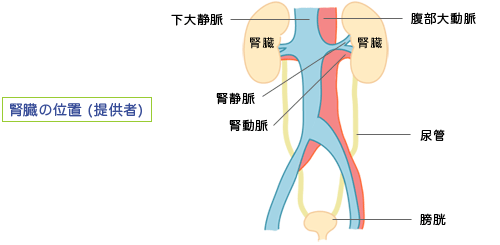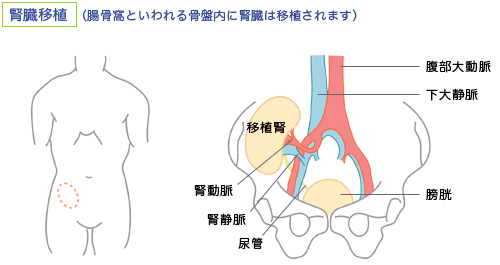
What is kidney transplant?
Kidney transplant is a treatment that restores the kidney function by transplanting a new kidney in the event when the kidney function is impaired (e.g., chronic kidney failure).
Tokiwakai Group has performed 23 kidney transplants under the cooperation of The Urology Department at Tokyo Women’s Medical University and Niigata University.
We perform transplants that are generally difficult due to immunological rejection, such as ABO incompatible kidney transplants, spousal donor kidney transplant, etc.
There are two main types of treatment for chronic kidney failure: dialysis treatment and kidney transplantation.
For dialysis treatment, there are two types: hemodialysis and peritoneal dialysis. This treatment is time-consuming, and it is performed only for a portion of the kidney function.
On the other hand, for a kidney transplant, the function of the lost kidney is almost completely restored, and it is not time-consuming. Further, dietary restrictions are relatively low. It has been shown that complete rehabilitation is possible and complications due to long-term dialysis can be avoided.
Kidney transplantation facts
There are two types of kidney transplants: kidney transplants from a deceased donor and living kidney transplants from a family member.
In Japan, there are few kidney transplants from a deceased donor, and living kidney transplants account for most of the kidney transplants. At Iwaki Hinyokika Clinic, all cases to date have been of living kidney transplants.
As a transplanted kidney is from someone else, even if it is provided by your family member, the body tries to eliminate the transplanted kidney by the immune system.
This is called rejection.
Rejection destroys the transplanted kidney; therefore, immunosuppressants should be used to control rejection.
While the transplanted kidneys are functioning, immunosuppressants are administered.
Inspite of taking immunosuppressants, there are cases, wherein rejection may not be controlled, which causes the transplanted kidney to fail.
However, with the recent development in new immunosuppressants, the treatment for rejection has improved and the transplanted kidneys are becoming surviving better than before.
There are more than 90% people who have transplanted kidneys functioning for more than 5 years since the transplantation.
There are also many people who have had kidneys working longer, and some have been functioning for more than 30 years as well after the transplantation.

Kidney location (provider)

Kidney transplant (the kidney is transplanted into the pelvis, called the iliac fossa)
Tokiwakai also conducts so-called ABO-incompatible kidney transplantation.
Like incorrect blood transfusion causes disaster, kidney transplants with different blood types were once thought to be impossible due to severe rejection.
However, with the advent of effective immunosuppressants and the removal of blood group antibodies before surgery, transplantation is now possible in such cases.
However, strict management before and after the transplantation is important.
We have been performing ABO-incompatible kidney transplantation with a joint team of experienced urologists of the Urology Department at Niigata University and Tokyo Women’s Medical University.